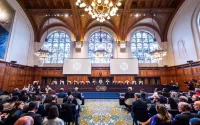24 October 2006Alex Morales
The world's ecosystem is being degraded by humans at an unsustainable rate that risks causing ``irreversible damage'' to the planet, the conservation group WWF said.
For two decades, people have used more resources per year than the Earth can produce, and consumption, or the ``ecological footprint,'' now exceeds production by about 25 percent, WWF said in its biennial ``Living Planet'' report.
``We have been exceeding the Earth's ability to support our lifestyles for the past 20 years, and we need to stop,'' WWF Director General James Leape said in the foreword to the report, posted on the WWF Web site. ``We must balance our consumption with the natural world's capacity to regenerate and absorb our wastes. If we do not, we risk irreversible damage.''
The effects of human activity can already be seen on the populations of other species, according to the report. Land animals have declined in population by about 31 percent since 1970, marine animals by 27 percent, and freshwater creatures by 28 percent, WWF said.
WWF calculated the resources produced by the Earth and those used by its population, and gave an index to show the ``ecological footprint'' of people around the world, measured in global hectares -- defined as a hectare of the Earth with a world-average ability to produce resources and absorb waste.
Two Planets Needed
In 2003, the last year for which WWF had data, humans used 14.1 billion global hectares of resources -- 2.2 hectares per person -- compared with the Earth's annual capacity of 11.2 billion hectares. The biggest users were residents of the United Arab Emirates, who required almost 12 hectares per person, the U.S., at about 9.5 hectares, and Finland, at just over 7.5. Afghans, Somalis and Bangladeshis used the least resources.
The Earth's accumulation of ecological assets -- such as fossil fuels, minerals and forests -- means they can be harvested at a faster rate than they regenerate, though for a ``limited period'' only, according to WWF, which is known in the U.S. and Canada as the World Wildlife Fund.
At current rates, ``by 2050 humanity will demand resources at double the rate at which the Earth can generate them,'' WWF said. ``At this level of ecological deficit, exhaustion of ecological assets and large-scale ecosystem collapse become increasingly likely.''
Almost half of the ecological footprint is due to emissions from fossil fuels; this should be the starting point to remedy the overshoot, Leape said. Cutting emissions and beginning work now on longer-term solutions that reduce reliance on resources are ``essential,'' according to the report.
Investment
``The cities, power plants, and homes we build today will either lock society into damaging overconsumption beyond our lifetimes, or begin to propel this and future generations towards sustainable living,'' Leape said. ``The good news is that this can be done. We already have technologies that can lighten our footprint, including many that can significantly reduce climate-threatening carbon dioxide emissions.''
Steps that can be taken including lowering personal consumption, reclaiming land that has been degraded, and stepping up recycling and reuse of goods, WWF said.
In some cases, apparent solutions don't necessarily decrease ecological footprint, according to the study. For instance, replacing fossil fuel usage with renewable energy sources such as wind, solar and hydroelectric power, cuts carbon dioxide emissions while increasing demand on land -- another component of the ecological footprint, according to WWF.
Economic Analysis
Governments need to begin economic analyses to determine how much needs to be spent on decreasing humanity's ecological footprint to avoid future costs associated with overuse of resources, the WWF said. Investment will be needed in education, technology, conservation, and urban and family planning, and new business models and financial markets will be required, it said.
``Humanity is no longer living off nature's interest, but drawing down its capital,'' WWF said. ``This growing pressure on ecosystems is causing habitat destruction or degradation and permanent loss of productivity, threatening both biodiversity and human well-being.''
To contact the reporter on this story: Alex Morales in London at [email protected] .
http://www.bloomberg.com/apps/news?pid=20601082&sid=asybYkLBp_tk






